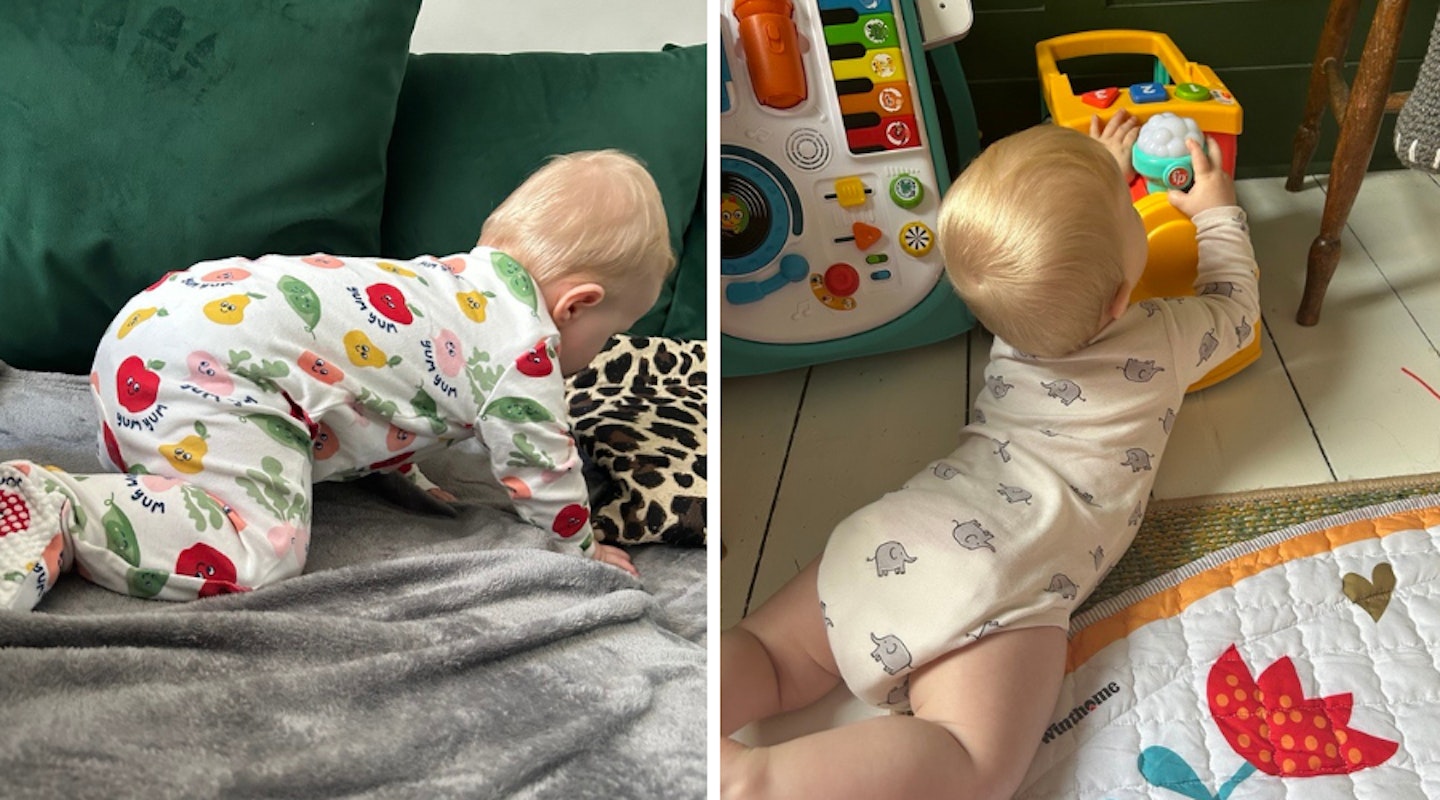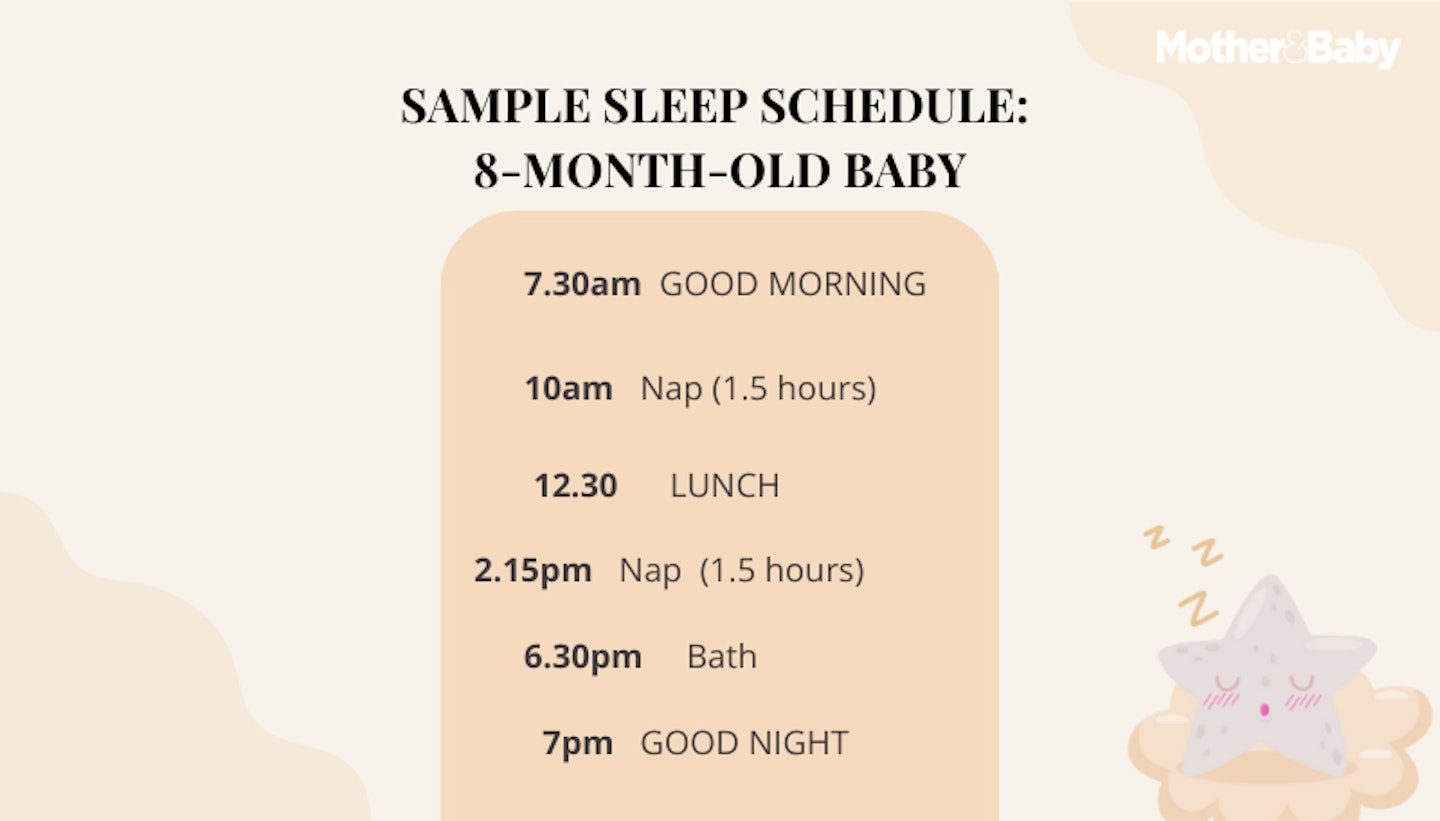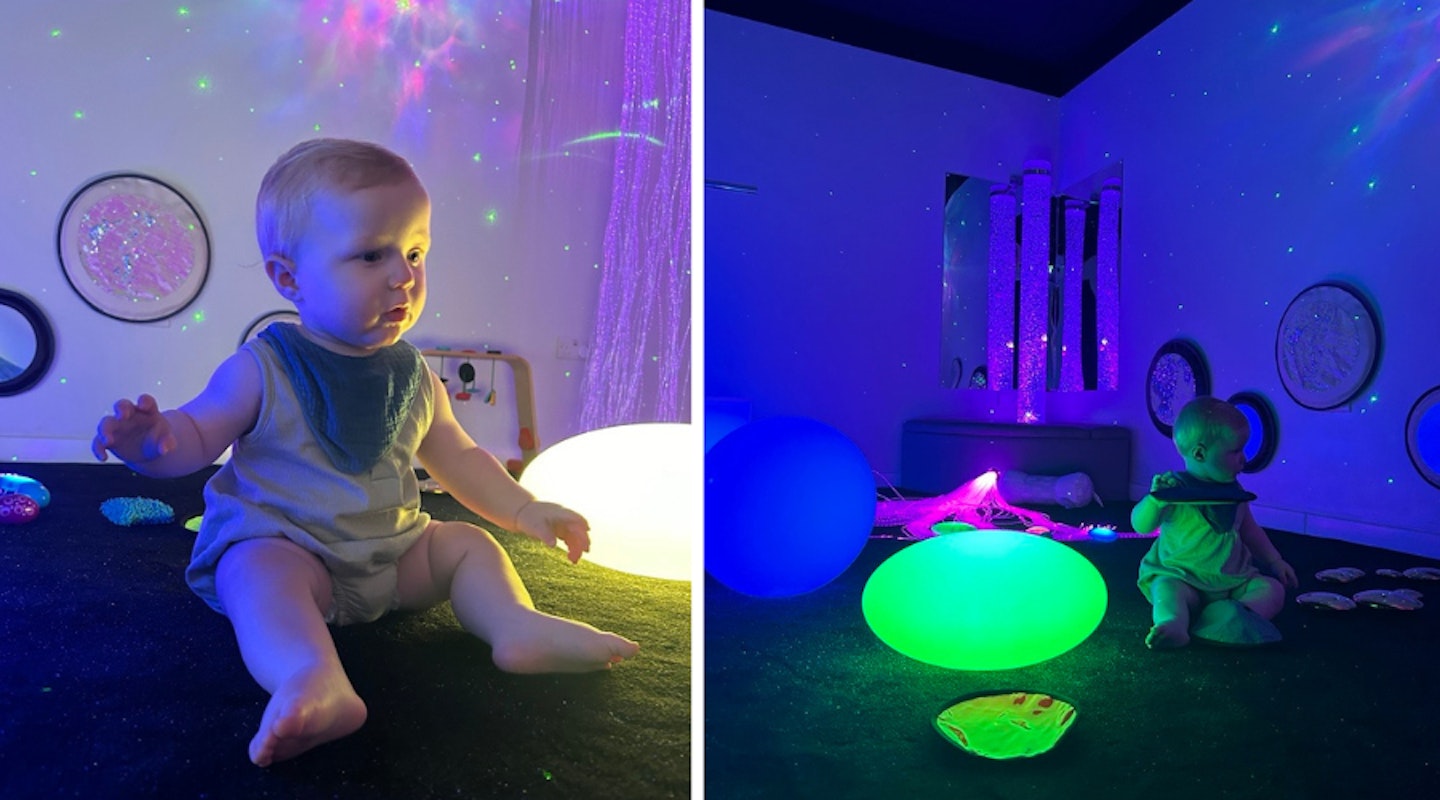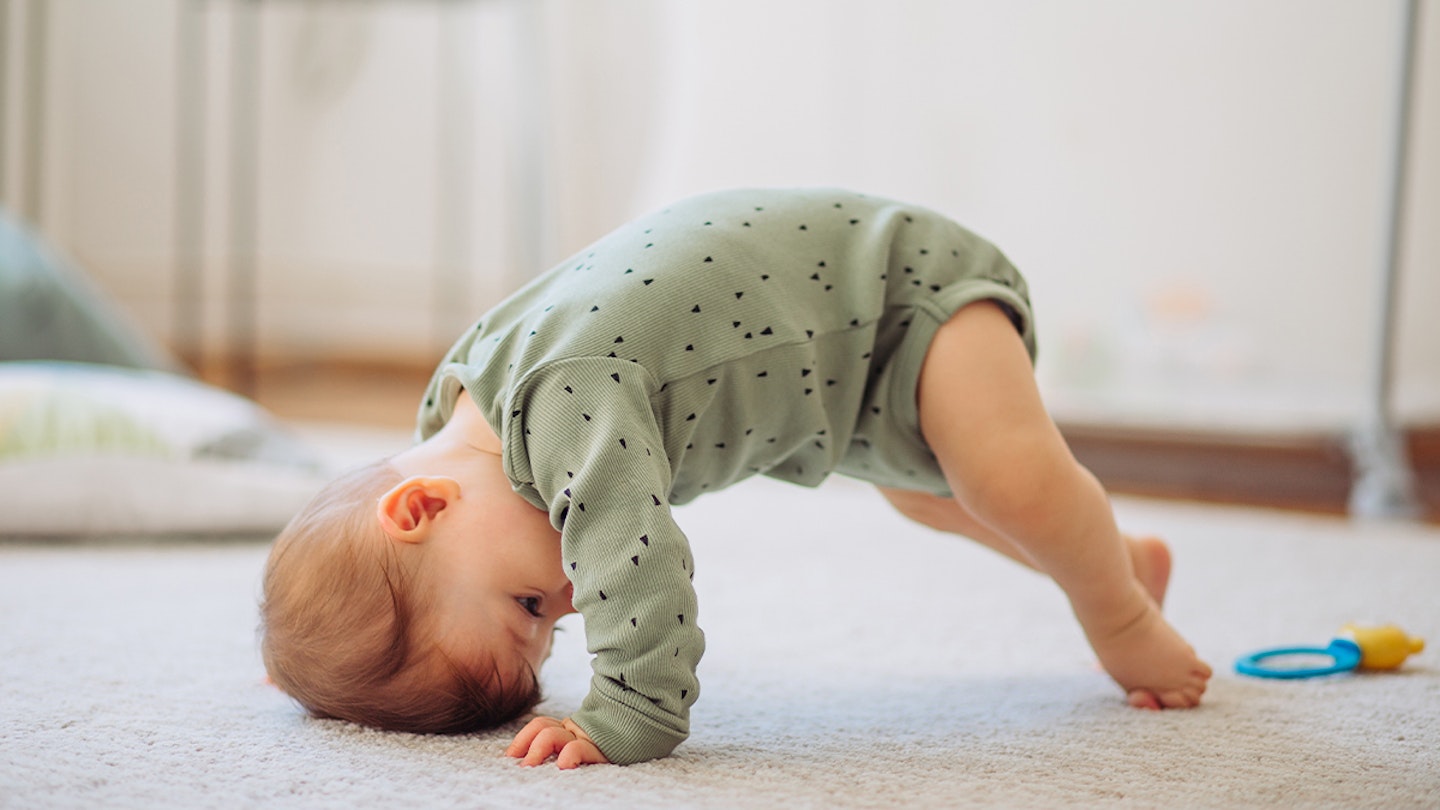And just like that, you have an 8 month old baby on your hands and boy are they on the move. This month, your little bundle of joy will be reaching all sorts of exciting baby development milestones, from crawling and sitting to talking to an improved attention span. Your baby's language and social skills are coming on leaps and bounds, making playtime so much more fun but you'll definitely be kept on your toes.
We spoke to Dr Amanda Gummer, a neuro-psychologist with over 20 years of experience in child development and play, to find out more about the development milestones and things we should be looking out for at 8 months. All babies develop differently, but this guide has been written to help you know what’s typical and when to reach out for help. Even though you are mostly left to your own devices when your little one is 8 months old, your doctor and local health visiting team are always available to help. Many have drop-in centres where you can get your baby weighed and ask questions about weaning and development.
Development milestones fo 8-month-old baby
At 8 months old, your baby will be going through significant physical development. They are continuing to develop and refine their gross and fine motor skills, which will help them explore and interact with their environment more effectively. They also may be starting to prepare to crawl or will be scooting around, so you may want to look at baby-proofing your home this month because your baby will be getting more and more mobile by the day.
Some of the physical development milestones that may occur around this age include:
Crawling
Many babies start crawling between 6 and 10 months old, and by 8 months, many are able to crawl effectively. Some may skip crawling altogether and get straight to walking, or some may like to shuffle along on their bottoms for while. It is also important to remember that every baby is different, some may even skip crawling altogether! Encourage tummy time throughout the day at 8 months old, and provide interesting toys and objects to keep a baby engaged, especially if baby is not yet crawling.

Pulling to stand
Some babies can pull themselves up to a standing position by 8 months old, using furniture or other objects for support. Your baby may prefer to pull to stand than crawl and will typically do this for a couple of months before being able to stand by themselves.
Sitting independently
By 8 months old, most babies can sit independently for periods of time without support. This is a whole new level of cuteness, especially for those adorable photos.
Improved hand-eye coordination
Babies at this age are starting to develop better hand-eye coordination, which means they can reach for and grab objects more accurately.
Teething
Many babies may be teething around this age, which can cause discomfort, irritability, and changes in eating and sleeping patterns.
How much should 8-month-old babies be sleeping?
At 8 months old, most babies require about 14 hours of sleep per day, which includes both daytime naps and nighttime sleep. Typically, babies at this age will sleep for 9-11 hours at night and have 2-3 naps during the day.
It's important to keep in mind that every baby is different and may have slightly different sleep needs. Some babies may require more or less sleep than average, and their nap schedules may vary.
Each nap will typically be around 1-2 hours long, although some babies may take shorter or longer naps. Below you'll find a sample sleep schedule for an 8-month-old baby.
Our top sleep tips for 8-month-olds:
Establish a calming bedtime routine
A predictable wind-down with a relaxing bath, cosy story, or soothing lullaby helps your baby link these cues to sleep.
Encourage daytime naps
Overtired babies often struggle to settle at night, so regular naps during the day can lead to better nighttime sleep.
Introduce a routine
Try and introduce a bedtime routine that is the same each night. This can include having dinner, bath, bedtime story and bedtime milk around the same time each evening. Keep the room dark, quiet, and cool, and you may also want to invest in a white noise machine to block out household sounds that might disturb them. Little repetitive things like this will help your baby understand when it is time to wind down for bed and will help them not be too overstimulated before bedtime.

8-month-old cognitive development
Some of the cognitive milestones that may occur around this age include:
Object permanence
Babies at this age are starting to understand that objects exist even when they are out of sight. This means that they may start to look for a toy that has been hidden or reach for an object that is just out of reach. There will also be a lot of babbling and laughing at 8 months old.
Increased attention span
At 8 months old, babies are starting to have a longer attention span and are able to focus on an object or activity for longer periods of time. Baby sensory classes, lights and toys are great for this age, as they will be taking it all in and will interact even more to colours, textures and sounds.

Improved problem-solving skills
Babies are starting to use trial and error to figure out how things work. They may try different methods to achieve a goal, such as reaching for an object or crawling towards a toy.
Feeding and nutrition for an 8-month-old baby
At 8 months old, most babies are consuming a combination of breast milk or formula and solid foods. The amount of breast milk or formula a baby needs can vary depending on their weight, activity level, and growth rate. As a general rule, most 8-month-old babies consume around 24-32 ounces of milk per day. If a baby is exclusively breastfed, they may be nursing 5-6 times per day. If your baby is formula-fed, they may be consuming 4-5 bottles per day.
In addition to breast milk or formula, most 8-month-old babies are starting to eat solid foods. At this age, babies are usually consuming 2-3 meals per day, with each meal consisting of a variety of nutrient-rich foods, such as pureed fruits and vegetables, whole grains, and protein sources like meats, beans, or tofu. If you're graduating to finger foods, always supervise your little one whilst eating and research how to serve food to your baby at each age. The amount of solid food a baby needs can vary depending on their appetite and growth rate. As a general guideline, most 8-month-old babies consume around 2-4 tablespoons of each type of food per meal. Over time, they will start to consume more solid foods and less milk. It's important to pay attention to a baby's hunger cues and adjust their feeding as needed.
8-month-old baby growth
Are you wondering how much your 8-month-old baby should grow? At around six months, your baby’s weight is usually tracked using percentile charts. These help health professionals monitor growth over time. Percentiles show how your baby compares to others of the same age; for example, if your little one is on the 50th percentile, it means they’re right in the middle (50 per cent of babies weigh more and 50 per cent weigh less). While the average 6-month-old weighs between 14 and 19 lbs, depending on birth weight and growth patterns, every single baby grows at their own pace. Midwives plot your baby’s weight on a growth chart in your 'Red Book' (Personal Child Health Record), which helps spot healthy progress or any concerns early on.
The average weight and length for a baby can vary depending on various factors, such as genetics, gender, and nutrition. However, here are some general guidelines for Western European cultures:
Weight: The average weight for an 8-month-old baby is around 16-21 pounds (7.2-9.5 kg) for boys and 15-20 pounds (6.8-9.1 kg) for girls.
Length: The average length for an 8-month-old baby is around 26-29 inches (66-74 cm) for boys and 25-28 inches (63-71 cm) for girls.
It's important to remember that every baby grows and develops at their own pace, and there is a wide range of what is considered "normal" for weight and length.
Your baby's health and safety: tips for 8-month-old baby
Teething
Many babies start teething around this age, which can cause discomfort, irritability, and changes in eating and sleeping habits. Some babies may also develop a low-grade fever, drool excessively, or have red, swollen gums.
Illnesses
Babies at this age are still developing their immune systems, so they may be more susceptible to illnesses such as colds, ear infections, and gastroenteritis.
At eight months, they are more susceptible to getting a little under the weather, especially as they are crawling around and putting everything they can find in their mouths. Little ones are likely to become ill many times in their first few years of life. So here are the signs to look for when you think your child may be unwell and some tips to keep germs at bay.
When to seek medical advice:
• A high fever (above 38°C) or a persistent low-grade fever.
• Fewer wet nappies, or unusual drowsiness and changes in feeding.
• If your baby is unusually irritable or hard to settle.
• A rash, difficulty breathing, or a bulging soft spot (fontanelle).
Nutritional concerns
As babies start to eat more solid foods, it's important to offer a variety of nutrient-rich foods to ensure they are getting all the vitamins and minerals they need. Introduce new foods gradually and watch for any signs of food allergies or sensitivities.
{#h-things-to-think-about-at-8-months}
Social interaction: Provide opportunities for social interaction, such as play dates with other babies or spending time with family members and friends.
Practical Parenting Tips: Looking After Yourself
At 8 months, your baby is really finding their personality, and the crawling stage may have started. This is super cute and so exciting (crawling is hilarious), but it can be pretty tiring at times. You'll definitely find that you'll need eyes in the back of your head. Investing in a baby play pen will create a safe space for your little one as they explore, crawl and even learn to stand. Plus, you might be able to drink a hot cup of tea or hang some washing out!
You may be thinking about your return to work, or are even back at work already, so introducing a routine can really help with meals and a bedtime routine. Your little one may be experiencing a fear of strangers at eight months and definitely has their 'favourite people', so if you are heading back to work, it is vital to let them spend time with familiar faces. Emotionally, this stage can be intense: your baby is growing and is speeding towards becoming a fully fledged toddler. But try to remember, there are still a few months of the baby stage to go, and you're in this together.
8-month-old baby FAQs
What milestones should my 8-month-old be doing?
Every baby is different but by 8 months some babies will be crawling, beginning to crawl and even pulling themselves up to a standing position. They are getting stronger and want to show off their strength. They'll also probably be a lot of babbling and you may hear 'mama' or 'dada' before too long.
Is teething likely at 8 months?
Yes, definitely. Many babies get their first or second tooth around 8 months (though it can happen earlier or later). Expect extra dribbling, chewing, and fussiness.
How many words should an 8-month-old say?
You may have heard 'dada' or 'mama' by 8 months but except a lot of babbling that only makes sense to your little one. Most babies say 'dada' first as it is easier to say!
About the expert
Dr Amanda Gummer is neuro-psychologist with over 20 years of experience in child development and play. She is the founder and CEO of The Good Play Guide, a leading independent review platform for children’s toys, apps, and educational products. Dr. Gummer also established Fundamentally Children, a research consultancy focused on child development and parenting.
About the author
Lorna White is the Products Editor for Mother&Baby. After running the Yours magazine website, specialising in content about caring for kids and grandchildren, Lorna brought her expertise to Mother&Baby in 2020. She has a keen interest in a range of topics, from potty training and nutrition to baby names and early development.
